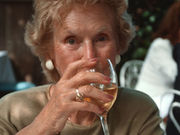Could White Wine Boost Your Melanoma Risk?
Large study ties a daily glass to a slightly elevated rate of the deadly skin cancer.
A new study raises the possibility that people who enjoy a glass of white wine every day may face a slightly elevated risk of melanoma.

Total alcohol intake was associated with a 14 percent higher risk of melanoma per drink per day, researchers found.
But, when they looked at the type of alcohol consumed, white wine emerged as the potential culprit. Each drink per day of white wine was associated with a 13 percent higher risk of melanoma, the researchers said.
"Per drink" risk was based on 12.8 grams of alcohol -- the median amount of alcohol in a beer, a glass of wine or a shot of spirits.
Beer, red wine and liquor did not significantly affect melanoma risk, the study authors added.
The study does not prove that white wine causes this deadly skin cancer. It merely shows an association, though one worth exploring, the researchers said.
"We are just adding one more cancer site that is related to alcohol consumption," said study author Eunyoung Cho. She is an associate professor of dermatology and epidemiology at Brown University's Warren Alpert Medical School, in Providence, R.I.
Curiously, the alcohol-and-melanoma link was stronger for parts of the body receiving less sun exposure. Exposure to the sun's damaging ultraviolet rays is a major risk factor for the disease.
Compared with non-drinkers, people who consumed 20 grams or more of alcohol a day were 73 percent more likely to be diagnosed with melanomas of the torso, the investigators found.
Cho said this finding may add to evidence that melanoma could have different causes depending on where on the body it surfaces.
Also, women's risk per drink per day was higher than men's. Men have larger bodies and may be better able to metabolize alcohol, Cho suggested.
Melanoma accounts for about 1 percent of skin cancers but a large majority of skin cancer deaths, according to the American Cancer Society. Rates of melanoma have been rising for the last 30 years, the cancer society said, with more than 76,000 cases diagnosed this year and more than 10,000 people expected to die.
Alcohol consumption has been linked to a number of cancers in humans, including cancers of the head and neck, esophagus, liver, breast and colon, according to the U.S. National Cancer Institute.
The relationship between alcohol intake and melanoma has been less clear.
Cho and her colleagues used data from three large studies involving more than 210,000 people who completed surveys that included questions about their alcoholic beverage intake.
Why white wine posed a heightened risk of melanoma is unclear. It may be due to higher levels of a toxin linked to DNA damage, the study authors theorized.
The study has certain strengths, including its large sample size and "prospective" design. That means people's alcohol intake was measured over an extended period of time -- in this case, more than 18 years, on average -- as researchers looked to see who might develop melanoma.
But the study also had certain limitations. Non-white study participants were excluded because there were too few to draw statistically valid conclusions, the researchers said. So, the findings can't be generalized for other racial and ethnic groups.
What's more, few participants reported heavy drinking.
"So what happens if you drink a fifth of vodka every day?" Rebbeck wondered. "Does that put you in a very different realm than people who have a glass of wine at dinner every night? Those are the kinds of questions we can't really answer yet."
Also, the study researchers were unable to account for people's use of sun protection, like sunblock, for example.
There's not sufficient evidence for a group like the World Health Organization's International Agency for Research on Cancer to label alcohol as a likely carcinogen for melanoma, Rebbeck said.
Rather, he said, this study "opens up the research gates" for future analysis.
Cho believes the findings could be more important for people who are already at high risk for melanoma, including fair-skinned individuals who burn and freckle easily, since "alcohol consumption is something you can change."
Source: HealthDay News
- 303 reads
Human Rights
Ringing FOWPAL’s Peace Bell for the World:Nobel Peace Prize Laureates’ Visions and Actions

Protecting the World’s Cultural Diversity for a Sustainable Future

The Peace Bell Resonates at the 27th Eurasian Economic Summit

Declaration of World Day of the Power of Hope Endorsed by People in 158 Nations

Puppet Show I International Friendship Day 2020

